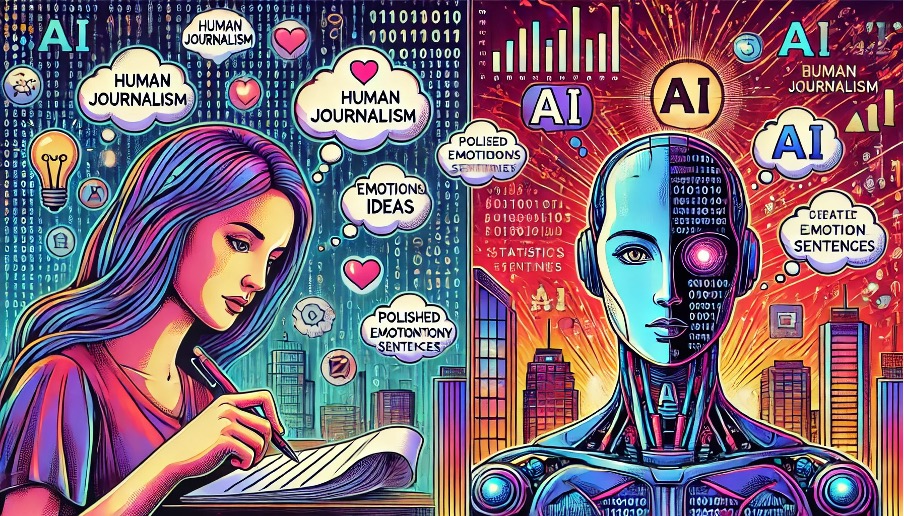
Content:
The rise of language models (LLMs), especially large language models (LLMs) such as GPT, in journalism has been met with mixed reviews. At first glance, it seems that a “smart” tool has appeared that can answer any question, write analytics, and even “make friends” with the user. But this is where the disappointments begin. LLM is not an intelligent personality, but a well-trained text prediction that emphasizes the artificial illusion of intelligence. Expectations for something more - for opinion, expertise, empathy - almost always end in disappointment.
A language model is not able to understand context or analyze emotions as a human would. Its “ comprehension ” is limited to statistics and patterns it has collected during its training. Therefore, LLM is a great tool for processing large amounts of information, but if you try to rely on it as a human to communicate, you will quickly realize that it lacks key elements of human perception.
It's a powerful marketing trick: investing in language models motivates corporations to show LLMs as a partial replacement for employees. The reality is more down-to-earth: it is a tool that can solve practical problems, help with information gathering, automate routine texts, but not replace staff.
Improving the quality of texts thanks to the LLM
Realizing the limitations of an LLM, many people are starting to use these tools to become a better writer, oddly enough. For people who previously had no writing skills, language models have become an effective assistant. Now everyone can formulate their thoughts clearly, because LLM will build the right logical connections, correct mistakes, and explain the key idea - and this is already a significant achievement!
Many people have started paying closer attention to reviewing their texts, as it’s well known that LLMs can make mistakes in facts and references. This need for proofreading and verification reduces the risk of blindly trusting automatically generated content and enhances the overall critical thinking of readers. Previously, it was quite difficult to separate objectivity from manipulation on the Internet, but now it has become more obvious, as a beautiful text no longer means reliable.
This is a new step for those who are just starting their careers in journalism or copywriting. They no longer need to struggle with a “blank page”: The LLM is able to generate initial versions of theses or even a draft of the publication, which is easier to work with. On the other hand, the criticality and vigilance that comes from working with LLM is shaping a new generation of journalists who always check the facts without relying on the proposed text.
New challenges for professional journalists
For professional writers and journalists, language models have created another “quality bar” to which they have to adapt. While it used to be possible to sometimes “ cut corners” on quality for the sake of speed or quantity, this is no longer accepted by the audience. Readers are getting used to flawlessly composed, structured texts from LLMs, and journalists have to take this into account when writing articles.
Today's professional writers have to work even harder on texts, adding their unique experience, interesting twists and turns, and expertise to make articles authentic and emotionally engaging. Now it is important not just to follow the rules of writing, but to integrate your own experiences and knowledge to emphasize the humanity of the text. For example, when you talk about complex social or political topics, inserting personal observations or life examples makes the text stronger and closer to the reader.
At the same time, LLMs put pressure on quality. On the one hand, there is a temptation to use LLMs to generate text quickly, but on the other hand, human uniqueness is becoming the characteristic that makes a professional writer stand out. There is a peculiar shift in journalism: writers now focus more on emotions, stories and experiences that only they know. This becomes a significant advantage over algorithms that cannot deeply understand the human context.
Transformation as a positive result of technology
Fears that language models will somehow completely displace people from journalism are exaggerated. Technology is indeed changing our society, but for the better. They are transforming the world around us, encouraging us to adapt and develop. LLMs help people to improve the quality of content, but they cannot become real authors, they are not capable of intuitive analysis, deep feelings or creative thinking, which are part of human nature.
And this is what ultimately preserves the importance and uniqueness of human writing. Technology contributes to a better world, where we value quality and emotional depth more, and understand the importance of verifiable facts and human stories. Language models are just a tool in the hands of a modern author, helping them to grow, but not replacing them.
#LLM